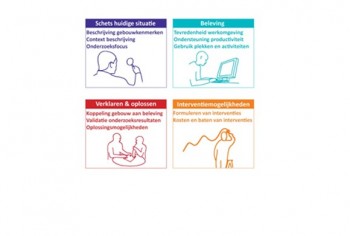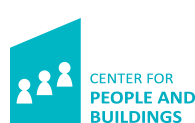WODI Questionnaire

In order to gain insight into the performance of the work environment, an integral, scientifically founded Work Environment Diagnosis Instrument (WODI) was developed. This instrument is suitable for any work environment, in any sector: cellular, combination or open plan offices; assigned or flexible work stations; government, business or academic work environments.
The main focus is on the physical work environment, but other aspects important to the experience and utilization of the work environment receive attention as well, e.g. productivity support and knowledge sharing, agreed use of the work environment, and implementation methods.
WODI makes it possible to measure to what extent accommodations goals are actually being met, in various ways and at various times. Does it make the work better, more pleasant? The instrument consists of several parts:
WODI Questionnaire
WODI is an online questionnaire for employees, mapping the experience and utilization of the work environment. Using this “quick scan,” the work environment’s most important bottlenecks and successes are brought to light. The WODI questionnaire may be supplemented using questions from one or more of the WODI in-depth resources or modules. These take a more detailed look at aspects deserving special attention. The WODI questionnaire is evaluated annually and updated based on the newest trends. We also work to increase our knowledge of the issues involved through annual themes. For 2014, these were questions from the “Concentration” module.
CfPB Benchmark
The CfPB Benchmark is a benchmark for office users’ average (dis)satisfaction with the most important aspects of their work environment examined using WODI. Thus, organizations may compare themselves to others for a clearer picture of their own accommodations' strengths and weaknesses. The CfPB Benchmark may also be used in order to determine preliminary target values for (future) accommodations. Every Spring, the Benchmark is updated using the data collected in the previous year, keeping the Benchmark current.
Building Inventory
The Building Inventory is used to map the physical characteristics of all buildings examined using WODI. This data is combined with the WODI results in order to try and identify relationships between physical characteristics and user satisfaction.
How does it Work?
When using WODI, the starting point is an online questionnaire distributed amongst the employees. The results are then put into perspective using the WODI Indicator. The research may be expanded through interviews, observation, document analysis, and workshops.When using WODI, the starting point is an online questionnaire distributed amongst the employees. The results are then put into perspective using the WODI Indicator. The research may be expanded through interviews, observation, document analysis, and workshops.
What good is it?
Results may be used to solve accommodations bottlenecks using specific tools, but also as the starting point for a (new) accommodations policy or management plan. Thus, the measurements concern all levels of an organization, including the board of directors, the management team, department heads, the works council and the employees. Because the WODI focuses primarily on the employees’ experience, it is also a means of showing that the organization sees accommodations as more than just an expense. The evaluation is a good foundation for internal dialogue about accommodations. All measurements are anonymized and collected in a database. This is used for cross-case analyses, contributing to general knowledge development concerning people, work and the work environment.
When?
WODI may be applied at various times, e.g.
- To execute a baseline measurement
- To (repeatedly) execute a follow-up measurement
- After an intervention in the accommodations
- At random, to measure if the accommodations remain satisfactory
- Periodically, to keep your finger on the pulse
Prior Application and Experience
So far, WODI has been applied to 45 organizations, both public and private.
Contactperson

